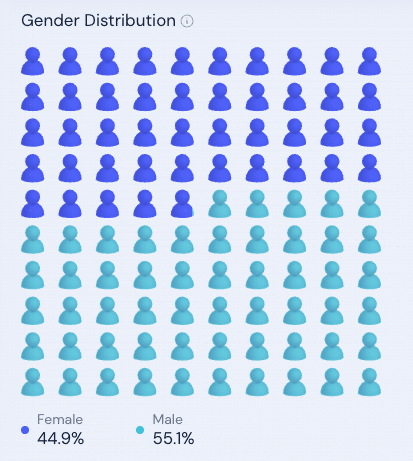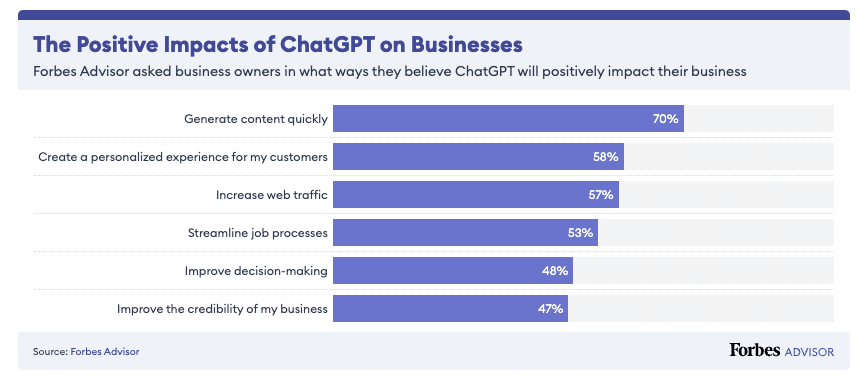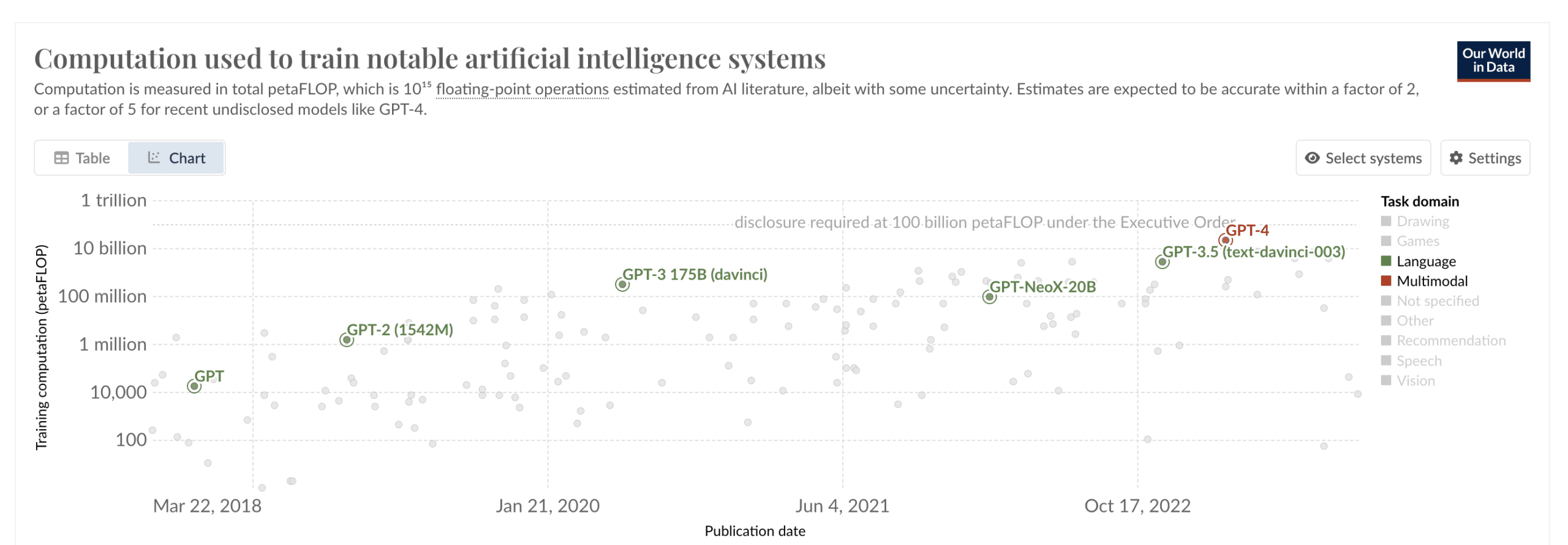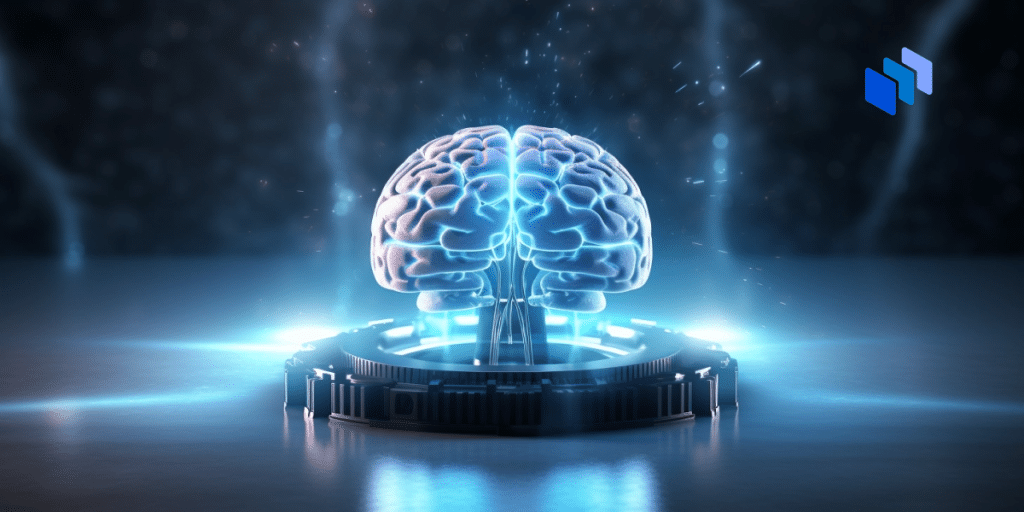On the occasion of ChatGPT‘s first birthday, we’ve consolidated key data on its user growth and usage patterns sourced from a variety of reports. This compilation is designed to provide a clear snapshot of the chatbot’s current standing and projected trajectory, making it a valuable resource for anyone interested in the evolving landscape of artificial intelligence (AI) technology.
In this article, we explore the latest ChatGPT statistics and trends, offering a comprehensive view of its growing influence in the tech world.
Whether you’re a tech enthusiast, researcher, or business professional, these insights into ChatGPT stats are crucial for staying informed in 2023.
ChatGPT Statistics Highlights
- ChatGPT reached 1 million users within its first days of being launched in November 2022 (Brockman, 2023).
- The daily operational cost of ChatGPT is estimated to be around $700,000 (Patel and Ahmad, 2023).
- 97% of business owners believe ChatGPT will benefit their operations within the next 12 months (Forbes, 2023).
- ChatGPT was right 72% of the time in various medical tasks (Rao et al., 2023).
- ChatGPT has the capability to understand and generate text in over 26 languages (OpenAI, 2023).
ChatGPT Usage and Engagement Statistics
ChatGPT has made a remarkable impact since its launch, setting records in user engagement and growth.
Below, we delve into the key ChatGPT usage statistics that illustrate its rapid rise and widespread adoption in 2023. These figures not only highlight its popularity but also shed light on user demographics and behavior patterns.
ChatGPT reached 1 million users within its first days of being launched in November 2022 (Brockman, 2023).
ChatGPT just crossed 1 million users; it's been 5 days since launch. https://t.co/cM1rQRSP8r
— Greg Brockman (@gdb) December 5, 2022
Furthermore, it became the second fastest-growing app in the world when it reached 100 million users in 2 months. ChatGPT user growth was only preceded by Threads, which garnered that number of users in 5 days (Live Mint, 2023).
In October 2023, the ChatGPT website generated 1.7 billion visits (Similar Web, 2023).
Moreover, in November 2023, the co-founder of OpenAI, Sam Altman, stated that the tool had reached 100 million weekly active users at the first developer conference (The Verge, 2023).
The bounce rate of the ChatGPT website stands at 31.5%. Users visit an average of 4.5 pages per visit, and the average duration of the visit is around 8 minutes (Similar Web, 2023).
The majority of visits were from:
- United States (15.3% of all desktop traffic going to the ChatGPT website)
- India (7.2%)
- Colombia (3.8%)
- Philippines (3.5%)
- Japan (3.0%)
(Similar Web, 2023)
The audience demographics of the ChatGPT website’s visitors reveal that the majority are male (55% vs. 45% female). Moreover, the majority of visitors are aged 25 to 34 (33.1% of visitors) and 18 to 24 (28.7%).
(Similar Web, 2023)
ChatGPT gets most of its social media traffic from YouTube (71.9%), followed by Whatsapp Webapp (7.0%) and Facebook Desktop (6.9%) (Similar Web, 2023).
ChatGPT in Education and Learning
ChatGPT is increasingly being used in educational settings. In fact, approximately one in five (19%) teenagers who are aware of ChatGPT have used it for schoolwork.
ChatGPT stats show that usage is higher among older students, with about one-quarter (24%) of 11th and 12th graders who know of ChatGPT using it for school tasks. The use is slightly lower among 9th and 10th graders (17%) and 7th and 8th graders (12%).
There was no significant difference in usage between boys and girls. (Pew Research, 2023)
Furthermore, the impact of ChatGPT on learning outcomes and engagement is gaining attention in the educational sector. A study tested how well ChatGPT could help in science learning for students from kindergarten to 12th grade. ChatGPT was used to create tests, grade answers, and suggest study materials, even for students with dyslexia.
The results showed that ChatGPT can handle tasks like making and grading tests and offering personalized help with learning. But, they also point out that ChatGPT can’t take over a teacher’s job – though teachers still need to know how to use ChatGPT properly in their classes. (Zhai, 2023)
Business Adoption of ChatGPT
The adoption of ChatGPT in the business world is rapidly increasing, reflecting a strong belief in its potential to enhance operations. This section examines the latest ChatGPT statistics and trends in how companies are integrating it into their workflows, customer interactions, and content strategies in 2023.
In fact, the majority of business owners (97%) believe ChatGPT will benefit their operations – with 90% saying that ChatGPT will improve their business within the next 12 months.
A significant 74% expect it to help in automatically responding to customer inquiries through chatbots (Forbes, 2023).
ChatGPT’s Role in Content Creation
ChatGPT is making waves in fields like academic research, social media, and marketing. A study points out its advantages and disadvantages in research and academia, noting its usefulness but cautioning against risks like plagiarism and over-reliance on AI.
It recommends setting ethical standards and integrating them into academic systems to manage these issues (Qasem, 2023).
Regarding marketing, Professor Margaret Campbell from UCR School of Business highlights how ChatGPT streamlines content creation and idea generation. Its main benefit is processing vast information quickly.
However, Campbell raises concerns about its accuracy, creativity limits, and unresolved ethical issues, such as content ownership. ChatGPT’s impact is also reshaping job roles in marketing, affecting positions related to writing, design, and data analysis, and potentially leading to new types of jobs (Campbell, 2023).
In fact, ChatGPT stats show that the majority of business owners believe the platform will help them quickly generate content for their business (70%).
(Forbes, 2023)
ChatGPT and Language Diversity
ChatGPT has the capability to understand and generate text in over 26 languages. Out of 26 languages tested, GPT-4 outperformed the English-language performance of GPT-3.5 and some low-resource languages like Welsh, Latvian, and Swahili (OpenAI, 2023).
In fact, nearly half of business owners (44%) foresee using ChatGPT to create content in different languages (Forbes, 2023).
However, researchers found that ChatGPT is great at translating many languages into English (Zhu et al., 2023) but that it finds it harder to turn English into other languages – especially ones like Korean that don’t use the same alphabet as English (Bang et al., 2023).
Moreover, systems similar to ChatGPT often have difficulty in smoothly blending languages within the same sentence, such as combining English and Tamil, a skill that billions around the world effortlessly use in their daily conversations (Yong et al., 2023).
ChatGPT in Healthcare and Medicine
Researchers found that when ChatGPT and doctors both answered health questions from Reddit‘s AskDocs, where real patients ask for medical advice, 79% of the time, healthcare experts liked ChatGPT’s answers better.
They thought the AI’s responses were not only correct but also showed more empathy and quality (Ayers et al., 2023).
Furthermore, ChatGPT is quite accurate in making clinical decisions. The study, which used case studies from textbooks, showed that ChatGPT was right 72% of the time in various medical tasks, from guessing possible illnesses to final diagnoses and treatment plans.
Moreover, ChatGPT correctly identified the final diagnosis 77% of the time. However, for “differential diagnosis” – understanding all potential conditions that certain symptoms might indicate – the AI’s success rate was lower, at 60% (Rao et al., 2023).
Technical Advances and Limitations of ChatGPT
Beginning with GPT-1 in 2018, every new version in the GPT series has been a major step forward in AI. GPT-1 was a pioneer in learning language without direct supervision. Following this, GPT-2, GPT-3, GPT-3.5, and the latest GPT-4 have each significantly improved in creating and understanding text, showing their versatility across different areas.
Training these models demands a lot of computing power. This is measured in FLOPs, which stands for floating-point operations per second. To put it into perspective, GPT-1 was trained with 17,600 petaFLOPs of computing power, whereas GPT-4 used an astounding 21 billion petaFLOPs.
(Our World in Data, 2023)
In fact, the daily operational cost of ChatGPT is estimated to be around $700,000. This figure, derived from ChatGPT stats in February 2023, translates to approximately $0.36 per query. With ChatGPT’s transition from GPT-3 to the more computationally demanding GPT-4, these costs are likely higher now (Patel and Ahmad, 2023).
Experts estimate that GPT-4’s training electricity consumption is between 51,772,500 and 62,318,750 KWh. This is roughly equivalent to the electricity that could power a small town for about 10 to 12 months (Towards Data Science, 2023).
Ethical Considerations and Privacy with ChatGPT
As ChatGPT continues to evolve and integrate into various sectors, ethical considerations and privacy concerns have become increasingly important. This section delves into the latest ChatGPT trends and stats for 2023 surrounding the ethical challenges and privacy issues associated with it.
OpenAI is currently facing a total of ten lawsuits, each addressing various issues related to copyright infringement, privacy violations, and trademark infringement.
For instance, multiple authors and the Authors Guild have filed lawsuits claiming that OpenAI used their works without permission to train ChatGPT, arguing against the fair use defense. Additionally, privacy-related lawsuits allege unauthorized data use in developing AI systems (Originality.AI, 2023).
Furthermore, as of January 2023, IT and security professionals said that ChatGPT was possibly being used:
- To help hackers craft more believable and legitimate-sounding phishing e-mails (53% of respondents)
- To help less experienced hackers improve their technical knowledge and develop their skills (49%)
- For spreading misinformation/disinformation (49%)
- To create new malware (48%)
- To increase the sophistication of threats/attacks (46%)
(Blackberry, 2023)
There are also concerns about bias with ChatGPT. For example, a study highlights how ChatGPT described male characters with terms like “expert” and “integrity,” whereas it referred to female characters as “beauty” or “delight.” It also used adjectives like “respectful” for men and “stunning” for women (Wan et al., 2023).
Researchers also found that ChatGPT tends to have a noticeable left-wing bias. Although the research didn’t specifically aim to uncover the causes of this political slant, it suggested two possible factors: the content of the training dataset, or the algorithm‘s design, which might be amplifying pre-existing biases within the training material (Motoki et al., 2023).
Future Trends and Predictions for ChatGPT
Exploring the future reveals exciting ChatGPT trends and predictions shaping its trajectory in 2023 and beyond. This section provides an overview of the anticipated advancements in AI, the potential workforce transformations, and the expected boost in productivity and economic growth.
With the rapid evolution of ChatGPT and similar technologies, these insights offer a glimpse into how these developments could influence various industries, the job market, and the overall economy.
- Advanced AI Development: ChatGPT and similar technologies are rapidly improving. They’re being trained with more data, which enhances their capabilities. This trend of expanding capabilities is expected to continue.
- Workforce Impact: A study by OpenAI and the University of Pennsylvania indicated that large language models (LLMs), including GPT-4, could affect around 80% of the US workforce, with 19% of jobs being heavily impacted. This shift suggests a move towards more automation in cognitive tasks, potentially affecting high-income roles such as writers, digital designers, financial analysts, and blockchain engineers (Eloundou et al., 2023).
- Increased Productivity: A study from MIT found that using ChatGPT in the workplace can boost productivity. It’s particularly beneficial for those with less expertise, helping to level the playing field between different skill levels in the workforce (Noy and Zhang, 2023).
- Rapid Economic Productivity Growth: As AI automates cognitive tasks, a boost in economic productivity could occur more swiftly than with past technological revolutions. According to economist Anton Korinek, we might witness a significant productivity increase by the end of 2023 or 2024, owing to the rapid deployment and integration of AI technologies like ChatGPT in various industries (MIT Technology Review, 2023).
The Bottom Line
In 2023, ChatGPT statistics and trends highlight how the AI tool has significantly impacted various fields, rapidly gaining popularity and becoming a key tool in education, business, and healthcare. While it offers numerous benefits, like aiding in learning and enhancing business operations, concerns about job security and privacy issues have arisen.
Despite these challenges, the potential for increased productivity and transformative changes in professional landscapes is notable.
This overview of ChatGPT’s influence reflects its growing importance and the complex considerations it brings to the digital world.













